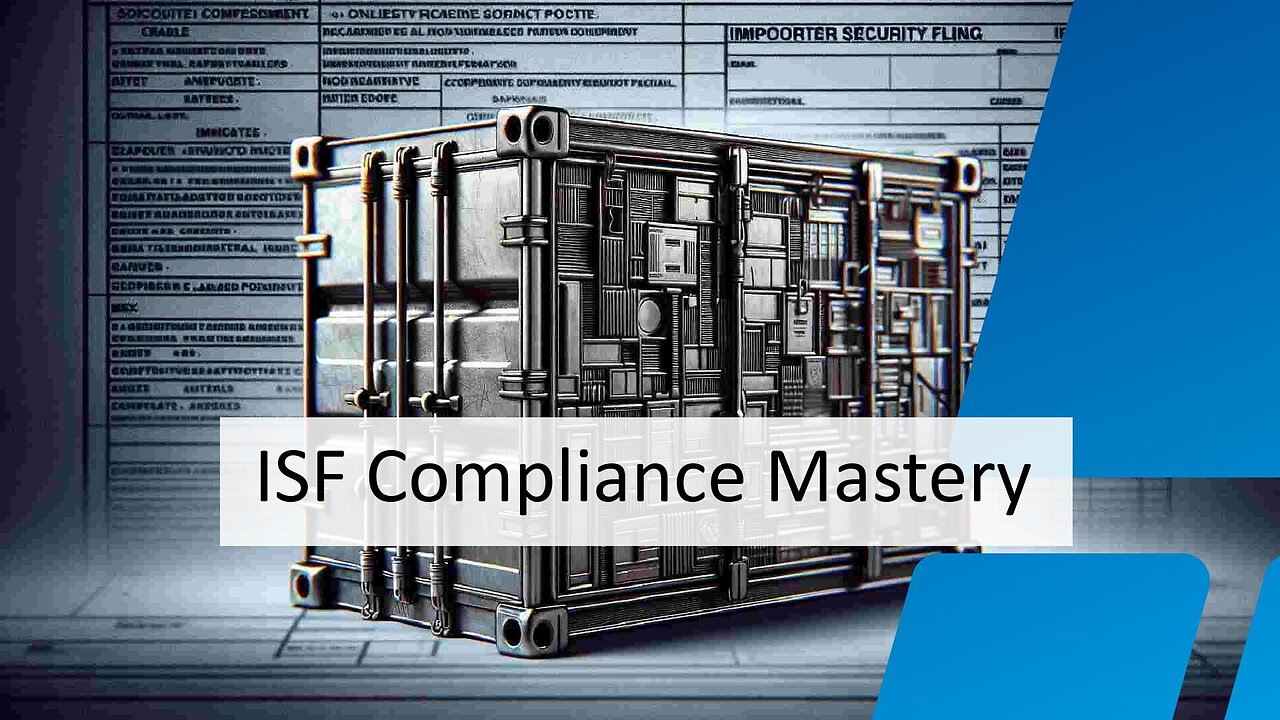Premium Only Content

Navigating Importer Security Filing: The Key to Regulatory Compliance Management
ISF Depot // 661-246-8217 // customs@isfdepot.com // www.isfdepot.com
Hello and welcome to our channel! In today's video, we will explore the crucial connection between Importer Security Filing (ISF) and regulatory compliance management in the context of customs brokerage. ISF, implemented by US Customs and Border Protection (CBP), requires importers or their agents to submit specific information about cargo before it arrives in the US. This information is essential for CBP to assess security risks and ensure supply chain safety. As a customs broker, your primary responsibility is to assist importers in accurately and timely filing the ISF while ensuring compliance with CBP regulations. However, it is crucial to understand the deeper connection between ISF and regulatory compliance management.
Regulatory compliance management involves ensuring importers adhere to the multitude of laws, regulations, and trade agreements governing international trade. In terms of the ISF, compliance management means keeping up with changing requirements and closely monitoring the filing process. By connecting ISF with regulatory compliance management, customs brokers play a critical role in ensuring their clients comply with all relevant regulations. This includes ensuring the accuracy, timeliness, and completeness of ISF filings. Customs brokers must work closely with importers to gather and verify required data such as shipper's name, consignee's name, and commodity description.
Additionally, customs brokers can assist importers in obtaining and maintaining customs bonds, which serve as financial guarantees for compliance and payment of duties, taxes, and fees. Customs bond management is part of the overall regulatory compliance management process and helps importers navigate the complexities of international trade. Effective regulatory compliance management also involves staying informed about changes to customs regulations, trade agreements, and government policies. Customs brokers must actively monitor updates and communicate relevant information to clients for adjustments in supply chain strategies, tariff classifications, and documentation processes.
Effective regulatory compliance management goes beyond avoiding penalties. It enables importers to establish positive relationships with government agencies, reduce shipment delays, and improve overall supply chain efficiency. This, in turn, saves time and money while enhancing their reputation among international trading partners. In conclusion, the connection between ISF and regulatory compliance management is crucial for customs brokers and importers. Understanding and effectively managing both aspects enable customs brokers to help clients navigate international trade complexities while maintaining compliance with regulations and requirements. Thank you for watching, and stay tuned for more videos diving further into customs brokerage and international trade. Don't forget to like, share, and subscribe for more engaging content. Happy trading!
#usimportbond #isfcustomsbroker #uscustomsclearing #isfentry
Video Disclaimer Here: This tutorial is independent and not affiliated with any US governmental entities.00:24 Importer Security Filing (ISF) is a requirement
00:49 Customs brokers assist importers in accurately and timely filing
01:21 Regulatory compliance management involves staying updated
02:47 Effective regulatory compliance management
03:10 The connection between ISF and regulatory compliance management
-
 27:09
27:09
MYLUNCHBREAK CHANNEL PAGE
15 hours agoDilmun: Where Life Never Ends
60.8K39 -
 2:58:32
2:58:32
Slightly Offensive
8 hours ago $49.33 earnedHas Trump FAILED US? The ABSOLUTE STATE of The Right Wing | Guest: Nick Fuentes
78.4K42 -
 1:37:05
1:37:05
AlaskanBallistics
4 hours ago $0.91 earnedI Love This Gun PodCast #16
18K3 -
 2:59:26
2:59:26
Twins Pod
12 hours agoEMERGENCY PODCAST WITH ANDREW TATE! - Twins Pod - Special Episode - Andrew Tate
148K148 -
 2:52:01
2:52:01
Jewels Jones Live ®
2 days agoTRUMP SECURES BORDER | A Political Rendezvous - Ep. 113
74.7K36 -
 25:02
25:02
marcushouse
1 day ago $41.34 earnedStarship Just Exploded 💥 What Went Wrong This Time?!
158K77 -
 12:00
12:00
Silver Dragons
1 day agoBullion Dealer Reveals Best Silver to Buy With $1,000
91.9K9 -
 12:58
12:58
NinjaGamblers
16 hours ago $14.52 earnedIs This The BEST Way to Win At Roulette? 😲
139K13 -
 1:01:54
1:01:54
CharLee Simons Presents Do Not Talk
3 days agoCALIFORNIA'S DONE!
94.4K40 -
 7:33
7:33
MudandMunitions
1 day agoUnboxing My FIRST Revolver! Smith & Wesson 442 .38 Special and What’s Coming Next for the Channel
123K16